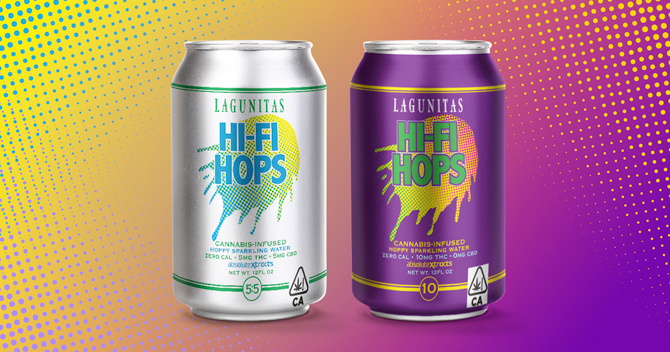
As the majority of beer business stakeholders continue to examine what impact recreational cannabis could have on the industry, one alcohol trade association has officially come out in support of legalizing the psychoactive drug.
The Wine & Spirits Wholesalers of America (WSWA), A Washington, D.C. trade group that works to advance the interests of distributors and brokers of wine and spirits, yesterday announced “an official policy position in favor of a state’s right to establish a legal, well-regulated, adult-use cannabis marketplace.”
In doing so, the WSWA became the first beverage alcohol trade association to support ending a federal ban on recreational marijuana in order for individual states to move forward, unencumbered, with their own legalization policies.
“Eight decades ago, Americans acknowledged that the Prohibition of alcohol was a failed policy,” Dawson Hobbs, the WSWA’s acting executive vice president of external affairs, said via a press release. “The state-based system of regulation, adopted after Prohibition, created a U.S. beverage alcohol market that is the safest, most competitive and best regulated in the world.”
Recreational cannabis sales are currently legal in nine states and Washington, D.C., while 29 states have legalized medical marijuana, and the WSWA believes that the industry in North America — which racked up $9.2 billion in total sales last year, according to BDS Analytics, a Colorado-based market research firm that tracks sales in the cannabis industry — is going to continue to expand.
In an email to Brewbound, a spokesperson for the WSWA said that “cannabis is here to stay,” and that continued legalization efforts are inevitable.
That’s why the WSWA is arguing for a state-based regulatory framework similar to the one that exists in the alcohol industry, which it believes would ensure “safe consumption.”
“What I think ending prohibition for cannabis would do — if you enact appropriate regulations at the state level — would allow those states that choose to legalize to have a safe marketplace that serves the consumer, that allows business to operate openly, and allows businesses to operate in a safe manner so that consumers know what they are getting,” Hobbs told Fox Business’ Lisa Kennedy yesterday.
In a press release announcing its support of legalized cannabis, the WSWA offered a number of “key components” that regulators should consider when setting policy, including a minimum purchasing age, the establishment of impaired driving standards, tax collection and enforcement and various selling restrictions, among others.
“What we’re talking about is just creating a pathway for states to have federal recognition of legalization, by enacting appropriate regulation that creates a safe and reliable marketplace,” Hobbs told Fox.
Reached for comment, a spokesperson with the Beer Institute, a national trade group representing the interests of large and small brewers as well as industry suppliers, said the organization did not have an official position on the legalization of cannabis.
The group did, however, dedicate time to the subject at its annual meeting, held last month in Milwaukee, Wisconsin. The BI invited Jessica Lukas, the vice president of consumer insights at BDS Analytics, and Rick Garza, the director of the Washington State Liquor and Cannabis Board, to deliver two separate presentations on the state of legal cannabis in the U.S.
According to Lukas, legal sales of cannabis in North America are expected to grow to $24.2 billion by 2021 and 83 percent of Americans agree that there should be “some form of legal marijuana usage.”
For his part, Hobbs said the WSWA plans to lobby Congress to pass legislation that allows states to legalize cannabis with “a minimum regulatory threshold.”
The announcement comes about one month after President Donald Trump said he would likely support legislation to end the federal ban on marijuana.
It also came a day before New York Gov. Andrew Cuomo (D) and his administration released a state Health Department report, which found that “regulated marijuana program would have health, social justice, and economic benefits.”
“It has become less a question of whether to legalize but how to do so responsibly,” the report read.

Despite what appears to be overwhelming support for the legalization of cannabis and approval from one corner of the alcohol industry, one beer industry insider, who asked not to be named, told Brewbound that “it’s better to be right than to be first” when asked why many beer industry stakeholders have been hesitant to take a position.
Nevertheless, a number of beer companies have already moved forward with investments into the cannabis sector, even though federal regulatory concerns still exist.
Constellation Brands, which owns a variety of wine and spirits labels in addition to the Corona, Modelo, and Pacifico import brands, is looking to develop a line of cannabis-infused beverages. It owns a 9.9 percent stake in Canada’s Canopy Growth Corporation (WEED), the world’s largest publicly traded cannabis company.
Meanwhile, Heineken-owned Lagunitas Brewing Company recently announced the launch of Hi-Fi Hops, a non-alcoholic sparkling water product that is infused with THC, CBD and hop oils.
Craft Brew Alliance is also examining the possibility of a CBD-infused beer and Molson Coors is said to be in talks with “several” Canadian marijuana companies as it considers introducing a line of cannabis-infused beverages.
The WSWA’s full press release can be found here.